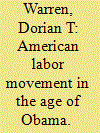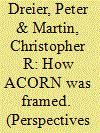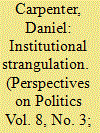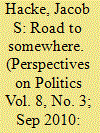|
|
|
Sort Order |
|
|
|
Items / Page
|
|
|
|
|
|
|
| Srl | Item |
| 1 |
ID:
099316


|
|
|
|
|
| Publication |
2010.
|
| Summary/Abstract |
The relative weakness of the American labor movement has broader political consequences, particularly for the ambitions of the Obama presidency. Absent a strong countervailing political constituency like organized labor, well-organized and more powerful stakeholders like business and industry groups are able to exert undue influence in American democracy, thereby frustrating attempts at political reform. I argue that it is impossible to understand the current political situation confronting the Obama administration without an account of the underlying sources of labor weakness in the U.S. In such an account two factors loom especially large. One is the role of the state in structuring labor market institutions and the rules of the game for labor-business interactions. The second is the distinctively racialized character of the U.S. political economy, which has contributed to labor market segmentation, a unique political geography, and the racial division of the U.S. working class. In our current post-industrial, post-civil rights racial and economic order, whether and how the labor movement can overcome its historical racial fragmentation will determine its possibilities for renewal and ultimately its political strength in relation to the Obama presidency. If the labor movement remains an uneven and weak regional organization hobbled by racial fragmentation, the Obama Administration's efforts to advance its core policy agenda will lack the necessary political force to be effective.
|
|
|
|
|
|
|
|
|
|
|
|
|
|
|
|
| 2 |
ID:
099319


|
|
|
|
|
| Publication |
2010.
|
| Summary/Abstract |
ierre Rosanvallon is one of the most important political theorists writing in French. Counter-Democracy: Politics in an Age of Distrust is a book about the limits of conventional understandings of democracy. Rosanvallon argues that while most theories of democracy focus on institutionalized forms of political participation (especially elections), the vitality of democracy rests equally on forms of "counter-democracy" through which citizens dissent, protest, and exert pressure from without on the democratic state. This argument is relevant to the concerns of a broad range of political scientists, most especially students of democratic theory, electoral and party politics, social movements, social capital, and "contentious politics." The goal of this symposium is to invite a number of political scientists who work on these issues to comment on the book from their distinctive disciplinary, methodological, and theoretical perspectives.
|
|
|
|
|
|
|
|
|
|
|
|
|
|
|
|
| 3 |
ID:
099306


|
|
|
|
|
| Publication |
2010.
|
| Summary/Abstract |
Using the news controversy over the community group ACORN, we illustrate the way that the media help set the agenda for public debate and frame the way that debate is shaped. Opinion entrepreneurs (primarily business and conservative groups and individuals, often working through web sites) set the story in motion as early as 2006, the conservative echo chamber orchestrated an anti-ACORN campaign in 2008, the Republican presidential campaign repeated the allegations with a more prominent platform, and the mainstream media reported the allegations without investigating their veracity. As a result, the little-known community organization became the subject of great controversy in the 2008 US presidential campaign, and was recognizable by 82 percent of respondents in a national survey. We analyze 2007-2008 coverage of ACORN by 15 major news media organizations and the narrative frames of their 647 stories during that period. Voter fraud was the dominant story frame, with 55 percent of the stories analyzed using it. We demonstrate that the national news media agenda is easily permeated by a persistent media campaign by opinion entrepreneurs alleging controversy, even when there is little or no truth to the story. Conversely, local news media, working outside of elite national news media sources to verify the most essential facts of the story, were the least likely to latch onto the "voter fraud" bandwagon.
|
|
|
|
|
|
|
|
|
|
|
|
|
|
|
|
| 4 |
ID:
099314


|
|
|
|
|
| Publication |
2010.
|
| Summary/Abstract |
The politics of financial reform represent a genuine test case for American politics and its institutions. The Obama administration's proposed reforms pit common (largely unorganized) interests against well-organized and wealthy minority interests. I describe how the withering and unfolding of financial reform has occurred not through open institutional opposition but through a quieter process that I call institutional strangulation. Institutional strangulation consists of much more than the stoppage of policies by aggregation of veto points as designed in the US Constitution. In the case of financial reform, it has non-constitutional veto points, including committee politics and cultural veto points (gender and professional finance), strategies of partisan intransigence, and perhaps most significantly, the bureaucratic politics of turf and reputation. These patterns can weaken common-interest reforms, especially in the broad arena of consumer protection.
|
|
|
|
|
|
|
|
|
|
|
|
|
|
|
|
| 5 |
ID:
099312


|
|
|
|
|
| Publication |
2010.
|
| Summary/Abstract |
President Barack Obama came into office with a social welfare policy agenda that aimed to reconstitute what can be understood as the "submerged state": a conglomeration of existing federal policies that incentivize and subsidize activities engaged in by private actors and individuals. By attempting to restructure the political economy involved in taxation, higher education policy, and health care, Obama ventured into a policy terrain that presents immense obstacles to reform itself and to the public's perception of its success. Over time the submerged state has fostered the profitability of particular industries and induced them to increase their political capacity, which they have exercised in efforts to maintain the status quo. Yet the submerged state simultaneously eludes most ordinary citizens: they have little awareness of its policies or their upwardly redistributive effects, and few are cognizant of what is at stake in reform efforts. This article shows how, in each of the three policy areas, the contours and dynamics of the submerged state have shaped the possibilities for reform and the form it has taken, the politics surrounding it, and its prospects for success. While the Obama Administration won hard-fought legislative accomplishments in each area, political success will continue to depend on how well policy design, policy delivery and political communication reveal policy reforms to citizens, so that they better understand how reforms function and what has been achieved.
|
|
|
|
|
|
|
|
|
|
|
|
|
|
|
|
| 6 |
ID:
099318


|
|
|
|
|
| Publication |
2010.
|
| Summary/Abstract |
Why did comprehensive health care reform pass in 2010? Why did it take the form it did-a form that, while undeniably ambitious, was also more limited than many advocates wanted, than health policy precedents set abroad, and than the scale of the problems it tackled? And why was this legislation, despite its limits, the subject of such vigorous and sometimes vicious attacks? These are the questions I tackle in this essay, drawing not just on recent scholarship on American politics but also on the somewhat-improbable experience that I had as an active participant in this fierce and polarized debate. My conclusions have implications not only for how political scientists should understand what happened in 2009-10, but also for how they should understand American politics. In particular, the central puzzles raised by the health reform debate suggest why students of American politics should give public policy-what government does to shape people's lives-a more central place within their investigations. Political scientists often characterize politics as a game among undifferentiated competitors, played out largely through campaigns and elections, with policy treated mostly as an afterthought-at best, as a means of testing theories of electoral influence and legislative politics. The health care debate makes transparent the weaknesses of this approach. On a range of key matters at the core of the discipline-the role and influence of interest groups; the nature of partisan policy competition; the sources of elite polarization; the relationship between voters, activists, and elected officials; and more-the substance of public policy makes a big difference. Focusing on what government actually does has normative benefits, serving as a useful corrective to the tendency of political science to veer into discussions of matters deemed trivial by most of the world outside the academy. But more important, it has major analytical payoffs-and not merely for our understanding of the great health care debate of 2009-10.
|
|
|
|
|
|
|
|
|
|
|
|
|
|
|
|
| 7 |
ID:
099302


|
|
|
|
|
| Publication |
2010.
|
| Summary/Abstract |
For the first time in American history, the 2000 United States census allowed individuals to choose more than one race. That new policy sets up our exploration of whether and how multiracialism is entering Americans' understanding and practice of race. By analyzing briefly earlier cases of racial construction, we uncover three factors important to understanding if and how intensely a feedback effect for racial classification will be generated. Using this framework, we find that multiracialism has been institutionalized in the federal government, and is moving toward institutionalization in the private sector and other governmental units. In addition, the small proportion of Americans who now define themselves as multiracial is growing absolutely and relatively, and evidence suggests a continued rise. Increasing multiracial identification is made more likely by racial mixture's growing prominence in American society-demographically, culturally, economically, and psychologically. However, the politics side of the feedback loop is complicated by the fact that identification is not identity. Traditional racial or ethnic loyalties and understandings remain strong, including among potential multiracial identifiers. Therefore, if mixed-race identification is to evolve into a multiracial identity, it may not be at the expense of existing group consciousness. Instead, we expect mixed-race identity to be contextual, fluid, and additive, so that it can be layered onto rather than substituted for traditional monoracial commitments. If the multiracial movement successfully challenges the longstanding understanding and practice of "one drop of blood" racial groups, it has the potential to change much of the politics and policy of American race relations.
|
|
|
|
|
|
|
|
|
|
|
|
|
|
|
|
| 8 |
ID:
099308


|
|
|
|
|
| Publication |
2010.
|
| Summary/Abstract |
President Obama's record stands out among modern presidents because of the wide range between his accomplishments and the boldness of his as-yet unfulfilled promises. Obamaism is a complex phenomenon, with multiple themes and policy ends. In this paper we examine the administration's initiatives drawing upon recent scholarship in political science to consider the political, economic and institutional constraints that Obama has faced and to assess how he has faced them. Our key theme is the importance of integrating the study of presidency and public leadership with the study of the political economy of the state. The paper argues against personalistic accounts of the Obama presidency in favor of a structured agency approach.
|
|
|
|
|
|
|
|
|
|
|
|
|
|
|
|
|
|
|
|
|